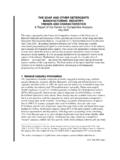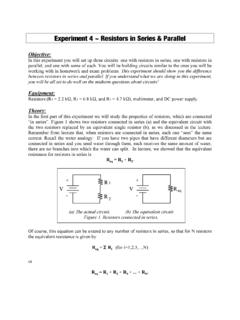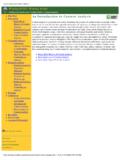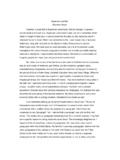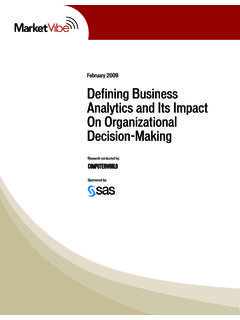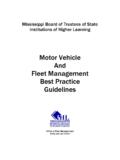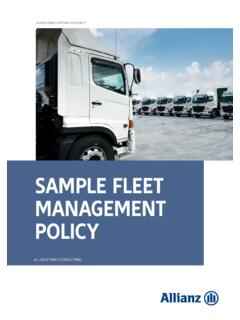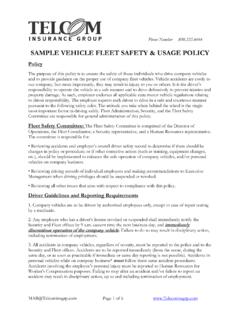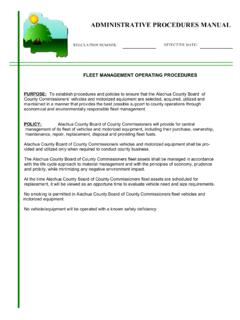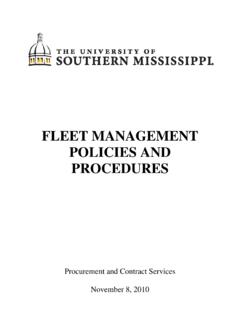Transcription of Fleet Management Solutions - University of Missouri–St ...
1 Fleet Management Solutions Prepared for: The Taxicab, Limousine, and Paratransit Foundation By The Center for Transportation Studies at the University of Missouri-Saint Louis Under Sponsorship from Midwest Transportation Consortium 2 TABLE OF CONTENTS Introduction .. 3 Changing role of Fleet managers .. 4 Planning maintenance Management 5 Computerized Fleet Management Solutions .. 6 Comparison Table .. 9 "Enrich Fleet Management System" from Richer Systems Group.
2 10 The Core Program .. 10 Optional Modules .. 12 "AutoManager-Lite" from 13 "RTA Fleet Management Software" from Ron Turley Associates .. 15 Main Modules .. 15 Add-on Modules .. 16 Recent Updates .. 17 Squarerigger Corporation s "Vehicle Tracker" .. 19 Bibliography ..24 3 Fleet Management Solutions Introduction Maintenance is a complex activity involving such variants as equipment, statistics, cost administration, productive activity, and business.
3 These variants must be well administered in order to be efficient. In the past, maintenance decisions have been limited to what kind of action to use (corrective or preventive) and to the definition of such variables as best frequency, best predictive technique, and best information Today, due to the changing role of Fleet Management and maintenance, decision-makers also must also consider the coordination of the human, physical, logistical, and logical structures of maintenance, which in turn must be combined with previous variables to create an integrated administration.
4 Maintenance may be seen as a group of interrelated structures that share the common objective of supporting and/or executing actions to maintain or In the case of Fleet vehicles, the variants are even more Factors such as size, responsibility of the task carried out, Fleet complexity, market characteristics, and competition level vary markedly from one activity branch to another, or even from among geographical areas. Traditionally, the information required to manage a Fleet of vehicles has been derived from observations made at the maintenance facility, utilizing mileage, 1 Frederico Freire de Carvalho Matos, (2000) Methodology for Planning Fleet Maintenance Systems 2 Dolce, J.
5 , (1998) Analytical Fleet Maintenance Management . SAE 2 ed. USA 4 consumables, operator defect cards, and other Today, more advanced technology allows vehicles to generate and store observations aboard the vehicles themselves. In this report we discuss some cost-effective technological Solutions available to help Fleet managers better manage their facilities. Changing role of Fleet managers New organizational structures and expanded computing options have dramatically changed the nature of Fleet Management .
6 Twenty years ago, maintaining equipment was generally the only responsibility that the maintenance manager had, and he did this within a budget allocated to him by upper Management . Today, the role of the Fleet manager has expanded from " Fleet only" to total maintenance Fleet managers must not only complete tasks but must also take responsibility for outcomes. The role of a Fleet manager has changed: From operations specialists to marketing and communications experts From hoarding resources to sharing resources From a total focus on cost to total customer satisfaction From viewing departments as separate entities to embracing cross-functional responsibilities and outcomes From a focus on downtime to one on reliable availability From shop mechanic to computer technician From total ownership of all equipment to the maximization of capital and technology 3 Abrams E.
7 , Hide H., Ho L., McKnight C., O Sullivan J., Price J., Schiavone J., Stark S., Venezia F.; (2000) Transit Fleet Maintenance , Transportation Research Board publications 4 Nelson, P. (2000) Reengineering Fleet Management TRB Transportation Research E- Circular E-C013 5 From owning and operating all fuel sites to a combination of strategies, including the universal card From outsourcing warranty work to becoming certified to do it "in house" In order to keep up with their changing roles and that of technology in Fleet maintenance Management .
8 Fleet managers have had to adopt a systematic approach toward planning maintenance systems, with the objective of optimizing the different aspects involved in maintenance. Planning maintenance Management systems Planning for Fleet maintenance Management systems begins with analyzing the requirements of the company (the operational requirements of the vehicles and the needs of the organization) with regard to Fleet These requirements further translate into technical objectives to be met by the planned system. Several different characteristics are analyzed: the organization, the vehicles, and operation conditions.
9 While assessing the needs of the company, the following parameters need to be considered: environmental demand, commitments to punctuality, supply chain, quantity demand, security requirement, and human resource After analyzing the requirements of the facility, the Fleet manager establishes a general idea of the functions and functional flow necessary for Fleet maintenance involving, for example, inventory and parts ordering, scheduling for preventive maintenance, etc. Furthermore, each function is analyzed based upon available solution alternatives: manual or computerized Management system, basic category of maintenance 5 Frederico Freire de Carvalho Matos, (2000) Methodology for Planning Fleet Maintenance Systems.
10 6 Riis JO, Luxhoj JT, Thorsteinsson U (1997) A Situational Maintenance Model. International Journal of Quality & Reliability Management v. 4 6 (regular inspections, corrective maintenance or preventive maintenance) and the basic repair functions (from non repair to complete repair of the vehicle).5 Finally, a Fleet Management solution is designed or chosen based on manual or computerized Management options. Some aspects that need to be considered while choosing a computerized Management solution are: Functional requirements that need to be met Cost effectiveness System flexibility Ease of use; and Training requirements and flexibility.
